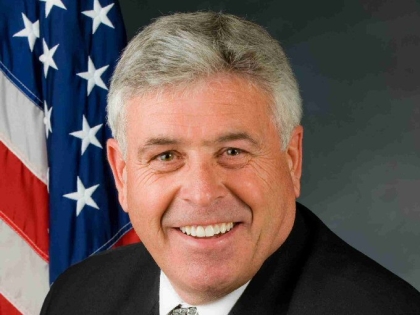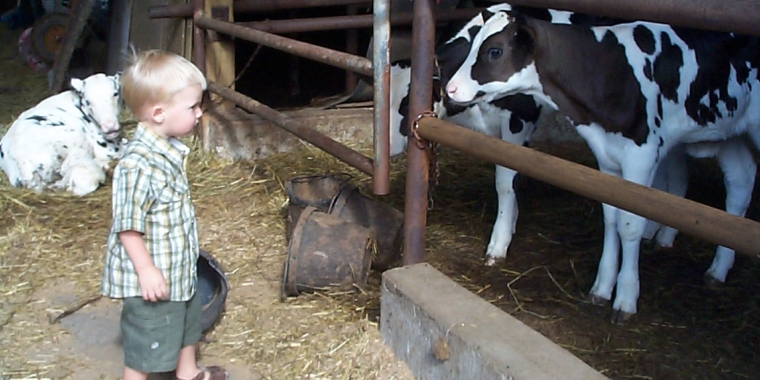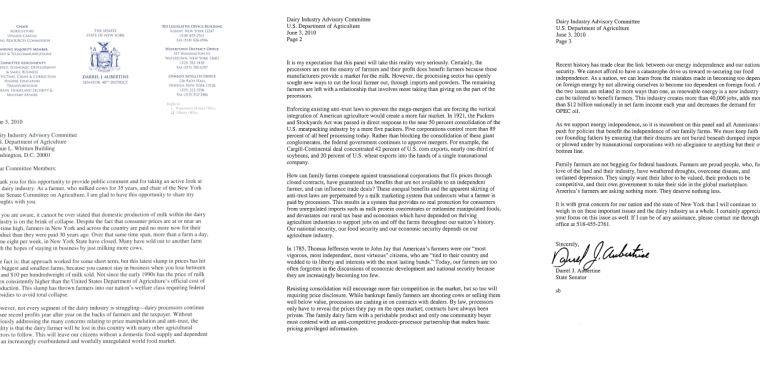
Aubertine Looking to Make Milk More Attractive
Legislation would require a product to be made with milk, not MPCs, if it’s called “dairy”
ALBANY (March 5, 2009)—State Sen. Darrel J. Aubertine has introduced legislation designed to make milk a more attractive ingredient for dairy processors. Legislation moved through the Agriculture Committee last week would keep processors from calling certain products dairy, if they’re made with milk protein concentrates instead of milk.
“With milk prices falling, we need to do all we can to help farmers get a premium price for their milk,” Sen. Aubertine, the chair of the Agriculture Committee, said. “By using MPCs and caseinates instead of milk, processors undermine the value of the milk we get from farms throughout New York State. Consumers can now look at the label on a myriad of products from gum and corn chips to diet shakes and processed cheese in New York State and see if the ingredients include MPCs or caseins, but the manufacturers are still able to claim certain products are dairy As dairy farmers know, if it’s not made with milk, it’s not dairy.”
Since he was first elected to the state Legislature as an Assemblyman, Sen. Aubertine has been fighting for dairy farmers to keep Milk Protein Concentrates, or MPCs, from reducing demand for real milk and make the public aware of legitimate concerns about the safety and nutritional value in MPCs and caseinates. He teamed up with members of both houses and from both parties to gain unanimous support for previous legislation that prohibited processors and manufacturers from listing MPCs as milk on the ingredient label.
“Senator Aubertine is a farmer himself. He knows where we’re coming from and he knows there have never been any studies for it,” said Fred Matthews, a dairy farmer from LaFargeville. “The FDA hasn’t approved it and it displaces our milk. It’s brought in from other countries and they produce it cheaply so it brings our price for milk down. I’ve been fighting this fight since 1989 and this is the worst I’ve ever seen it.”
While MPCs are now produced at one facility in New Mexico, the vast majority are imported from countries like the Ukraine, China, India, and New Zealand, but not regulated as a food product since they are widely used for glue.
“What we’re trying to do here is open the dialogue on importation of these products that aren’t produced to the same standards we follow here in New York and throughout the country,” Sen. Aubertine said. “I am working to help our farmers increase their bottom line and provide the highest quality dairy products for consumers.”
“This is what we’ve been trying to do for a long time,” said Floyd Hall, a retired LaFargeville dairy farmer. “MPCs displace the farmer’s raw milk. Plain and simple, no questions asked. Our biggest thing has been over the years to say that MPCs have had no study from the FDA to see if it is safe to put in foods or not. MPCs were manufactured to make glue. Senator Aubertine is looking out for the farmers and the consumers.”
According to recent news reports, imports of high-protein MPC climbed by 37 percent in the third quarter of 2008 and the importation of caseinates has grown by 43 percent.
“They are importing MPCS into this country so fast and every time they bring more in it displaces our milk,” said Stephen Sourwine, dairy farmer and owner of North Country Seed and Feed in Alexandria Bay. “Our country consumes more milk than it produces but they bring in this stuff and it’s what is bringing our prices down. There is a little bit made in this country, but most of it is in the third world where there are no health and safety standards. We’re losing farms left and right and all this stuff is doing is driving our price down.”
Imports of MPCs have gone up from around five million pounds in December 2004 to more than 16 million in December 2008. This has decreased demand despite a shortage of domestically produced milk, though processors still claim that farmers are getting a low price because they are producing too much milk.
“We are a dairy deficit nation, but we’ve seen the price of milk drop to just about $9 per hundred-weight,” Sen. Aubertine said. “Our farms are not going to survive if that’s all our farmers are getting for their quality product. We should not be letting foreign imports of milk and milk products hurt our dairy farmers and our consumers, since these imports are not regulated for quality and safety like in the United States. This bill would put New York in a position to make sure consumers are not misled into thinking they are getting real dairy products, when they can’t be sure of the origin or standards of the ingredients.”


